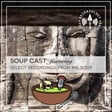
Trust Lacking in BBCR4 Today & BM’s Metal Detecting PR? - WB 5th Nov 2021
Welcome to Watching Brief. As the name implies, each week Marc (Mr Soup) & Andy Brockman of the Pipeline (Where history is tomorrow's news) cast an eye over news stories, topical media and entertainment and discuss and debate what they find.
0:00 Introduction
1:50 Today Prog Biased?
20:01 British Museum New TV Show
***
Link of the Week:
David Attenborough speaks at COP26:
***
Links:
The Interim Report on Colonialism and Slavery:
https://www.restoretrust.org.uk/restore-trust-issues/interimreport
We’ve Published our Report into Colonialism and Historic Slavery:
BBC Radio.4 Today Programme:
https://www.bbc.co.uk/programmes/b006qj9z
The Today Programme and The War on the National Trust:
Will the National Trust Now End its War on ‘Restore Trust’? :
https://www.spectator.co.uk/article/the-battle-for-the-soul-of-the-national-trust-rages-on
No Trust in the Today Programme:
http://thepipeline.info/blog/2021/11/05/no-trust-in-the-today-programme/
The National Trust has Needlessly Provoked an ‘Anti-Woke’ Campaign: https://www.theguardian.com/commentisfree/2021/oct/13/national-anti-woke-campaign-slavery-churchill-culture-war
Maitland – Neil Bennet CEO Profile:
https://www.maitland.co.uk/people/our-team/neil-bennett/
Restore Trust Website:
https://www.restoretrust.org.uk/
Code of Practice for Responsible Metal Detecting in England and Wales:
More 4 Links up with the British Museum to Learn More About Our Hidden History:
https://www.channel4.com/press/news/more-4-links-british-museum-learn-more-about-our-hidden-history
Association of Detectorists:
